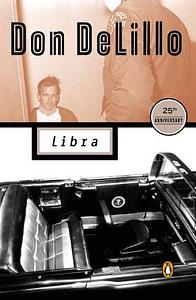Take a photo of a barcode or cover
I loved White Noise and Mao II from Delillo, wasn't as big a fan of this one. It seems like if you're going to write a book about the most famous assassination in American history you should probably have something to say, and I couldn't get much meaning out of this book. It seemed like just an interpretation of how things could have gone.
I think too the postmodern style of Delillo doesn't give me what I wanted from this story. The book felt too removed from the emotions of the characters participating in the conspiracy, I would have appreciated more of a sense of paranoia or urgency to what was happening.
I'm being critical, but I did enjoy the book overall. The ending in particular where Oswald's mother talks about how she experienced life with her son got some emotion out of me. There were a few parts of the book that made me think "what could happen to a 24 year old to make them assassinate the president?" and unfortunately I don't feel like the book presented any compelling answers.
I think too the postmodern style of Delillo doesn't give me what I wanted from this story. The book felt too removed from the emotions of the characters participating in the conspiracy, I would have appreciated more of a sense of paranoia or urgency to what was happening.
I'm being critical, but I did enjoy the book overall. The ending in particular where Oswald's mother talks about how she experienced life with her son got some emotion out of me. There were a few parts of the book that made me think "what could happen to a 24 year old to make them assassinate the president?" and unfortunately I don't feel like the book presented any compelling answers.
adventurous
challenging
dark
informative
mysterious
fast-paced
What a journey! While it does seem tediously involute at times in the middle, it all comes together in the end and the conspicuous bypasses into character history will reveal the hidden purpose of setting the American Experience so as to assist the explosion in the end.
challenging
dark
mysterious
tense
slow-paced
Plot or Character Driven:
A mix
Strong character development:
Yes
Loveable characters:
Complicated
Diverse cast of characters:
Yes
Flaws of characters a main focus:
Yes
adventurous
dark
reflective
sad
tense
medium-paced
Plot or Character Driven:
Character
Strong character development:
Yes
Loveable characters:
No
Diverse cast of characters:
Complicated
Flaws of characters a main focus:
Yes
challenging
dark
emotional
sad
tense
Plot or Character Driven:
A mix
Strong character development:
Yes
Loveable characters:
No
Diverse cast of characters:
No
Flaws of characters a main focus:
Yes
dark
mysterious
reflective
tense
slow-paced
Plot or Character Driven:
A mix
Strong character development:
Yes
Loveable characters:
Complicated
Diverse cast of characters:
No
Flaws of characters a main focus:
Complicated
dark
emotional
informative
mysterious
reflective
sad
tense
slow-paced
Plot or Character Driven:
Character
Strong character development:
Yes
Loveable characters:
Yes
Diverse cast of characters:
Yes
Flaws of characters a main focus:
Yes
DeLillo väver på ett skickligt sätt en konspiratorisk väv kring mordet på Kennedy. Vi får dels följa Oswalds liv och dels konspiratörerna genom ett antal olika personer. Bäst är porträttet av Oswald och DeLillo har en fantastiskt berättarteknik som låter blanda fragment av händelser, känslor och perspektiv som gör det till en ytterst njutbar ström av ord.
Normally not drawn to historical fiction, I was happily coerced into reading this fictional account of the life of Lee Harvey Oswald. While a lot of the looping facts and speculations are hard to keep track of unless you're fairly well-versed in the JFK assassination mythology, the novel itself is a faithful exploration of the intricate, often contradictory and marvelously coincidental nature of causation, the profound impact of the most subtle influence of one human on another, and the shockingly organized disarray of tormented minds. As usual, DeLillo's most potent genius is in his details: Oswald sees a dime on the floor of the book repository, picks it up and wipes it off before pulling his trigger, demonstrating the mindless humanness of an ordinary moment right before a catastrophe.
As he did in White Noise's "Most photographed barn in America" and in Underworld's meditation on the American obsession with baseball, DeLillo explores the peculiar tenor of group experience in the crowd scenes at Dealey Plaza: "A contagion had brought them here, some mystery of common impulse...They were here to be an event, a consciousness..."
And while the story follows many individual and collective voices, the most haunting is that of Marguerite Oswald, Lee's mother, weaving in and out of the narrative, grasping to piece together the larger story of her son's life-gone-wrong. A woman with limited education, reasoning, and self-awareness asking "Who arranged the life of Lee Harvey Oswald?" A question that points both to a sense of conspiracy and a more pervasive sense of helplessness and chaos.
On the subject of conspiracy, DeLillo offers this: "If we are on the outside, we assume a conpsiracy is the perfect working of a scheme... Conspirators have a logic and a daring beyond our reach." What he presents in Libra isn't an outline of a conspiracy or an argument for chaos, but an illustration of how easily the scales can be tipped in one direction or the other.
As he did in White Noise's "Most photographed barn in America" and in Underworld's meditation on the American obsession with baseball, DeLillo explores the peculiar tenor of group experience in the crowd scenes at Dealey Plaza: "A contagion had brought them here, some mystery of common impulse...They were here to be an event, a consciousness..."
And while the story follows many individual and collective voices, the most haunting is that of Marguerite Oswald, Lee's mother, weaving in and out of the narrative, grasping to piece together the larger story of her son's life-gone-wrong. A woman with limited education, reasoning, and self-awareness asking "Who arranged the life of Lee Harvey Oswald?" A question that points both to a sense of conspiracy and a more pervasive sense of helplessness and chaos.
On the subject of conspiracy, DeLillo offers this: "If we are on the outside, we assume a conpsiracy is the perfect working of a scheme... Conspirators have a logic and a daring beyond our reach." What he presents in Libra isn't an outline of a conspiracy or an argument for chaos, but an illustration of how easily the scales can be tipped in one direction or the other.



